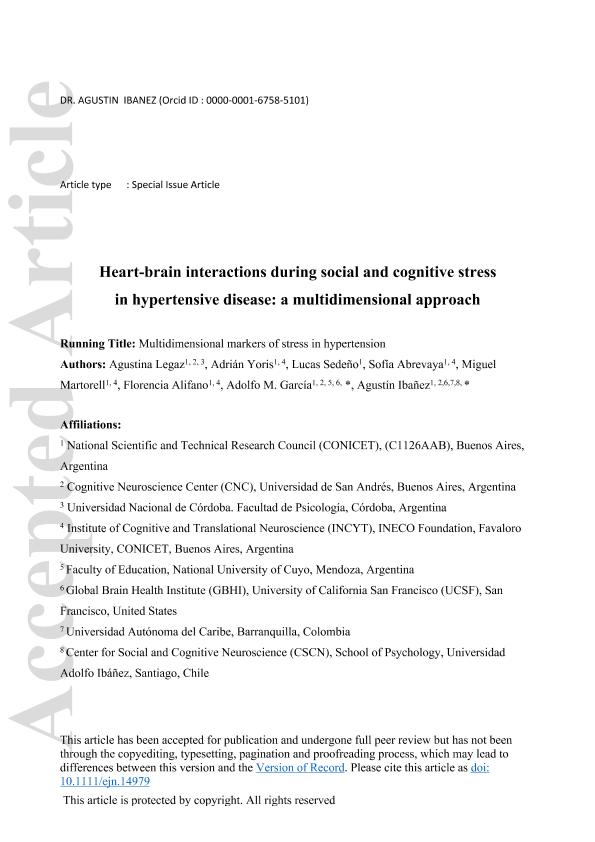Artículo
Heart–brain interactions during social and cognitive stress in hypertensive disease: A multidimensional approach
Legaz, Agustina ; Yoris Magnago, Adrián Ezequiel
; Yoris Magnago, Adrián Ezequiel ; Sedeño, Lucas
; Sedeño, Lucas ; Abrevaya, Sofia
; Abrevaya, Sofia ; Martorell Caro, Miguel Angel
; Martorell Caro, Miguel Angel ; Alifano Ferrero, Florencia
; Alifano Ferrero, Florencia ; García, Adolfo Martín
; García, Adolfo Martín ; Ibañez, Agustin Mariano
; Ibañez, Agustin Mariano
 ; Yoris Magnago, Adrián Ezequiel
; Yoris Magnago, Adrián Ezequiel ; Sedeño, Lucas
; Sedeño, Lucas ; Abrevaya, Sofia
; Abrevaya, Sofia ; Martorell Caro, Miguel Angel
; Martorell Caro, Miguel Angel ; Alifano Ferrero, Florencia
; Alifano Ferrero, Florencia ; García, Adolfo Martín
; García, Adolfo Martín ; Ibañez, Agustin Mariano
; Ibañez, Agustin Mariano
Fecha de publicación:
09/2020
Editorial:
Wiley Blackwell Publishing, Inc
Revista:
European Journal of Neuroscience
ISSN:
0953-816X
Idioma:
Inglés
Tipo de recurso:
Artículo publicado
Clasificación temática:
Resumen
Hypertensive disease (HTD), a prominent risk factor for cardiovascular and cerebrovascular diseases, is characterized by elevated stress-proneness. Since stress levels are underpinned by both cardiac and neural factors, multidimensional insights are required to robustly understand their disruption in HTD. Yet, despite their crucial relevance, heart rate variability (HRV) and multimodal neurocognitive markers of stress in HTD remain controversial and unexplored respectively. To bridge this gap, we studied cardiodynamic as well as electrophysiological and neuroanatomical measures of stress in HTD patients and healthy controls. Both groups performed the Trier Social Stress Test (TSST), a validated stress-inducing task comprising a baseline and a mental stress period. During both stages, we assessed a sensitive HRV parameter (the low frequency/high frequency [LF/HF ratio]) and an online neurophysiological measure (the heartbeat-evoked potential [HEP]). Also, we obtained neuroanatomical data via voxel-based morphometry (VBM) for correlation with online markers. Relative to controls, HTD patients exhibited increased LF/HF ratio and greater HEP modulations during baseline, reduced changes between baseline and stress periods, and lack of significant stress-related HRV modulations associated with the grey matter volume of putative frontrostriatal regions. Briefly, HTD patients presented signs of stress-related autonomic imbalance, reflected in a potential basal stress overload and a lack of responsiveness to acute psychosocial stress, accompanied by neurophysiological and neuroanatomical alterations. These multimodal insights underscore the relevance of neurocognitive data for developing innovations in the characterization, prognosis and treatment of HTD and other conditions with autonomic imbalance. More generally, these findings may offer new insights into heart–brain interactions.
Palabras clave:
HEART RATE VARIABILITY
,
HYPERTENSION
,
PSYCHOSOCIAL STRESS
Archivos asociados
Licencia
Identificadores
Colecciones
Articulos(INCYT)
Articulos de INSTITUTO DE NEUROCIENCIAS COGNITIVAS Y TRASLACIONAL
Articulos de INSTITUTO DE NEUROCIENCIAS COGNITIVAS Y TRASLACIONAL
Citación
Legaz, Agustina; Yoris Magnago, Adrián Ezequiel; Sedeño, Lucas; Abrevaya, Sofia; Martorell Caro, Miguel Angel; et al.; Heart–brain interactions during social and cognitive stress in hypertensive disease: A multidimensional approach; Wiley Blackwell Publishing, Inc; European Journal of Neuroscience; 55; 9-10; 9-2020; 2836-2850
Compartir
Altmétricas



